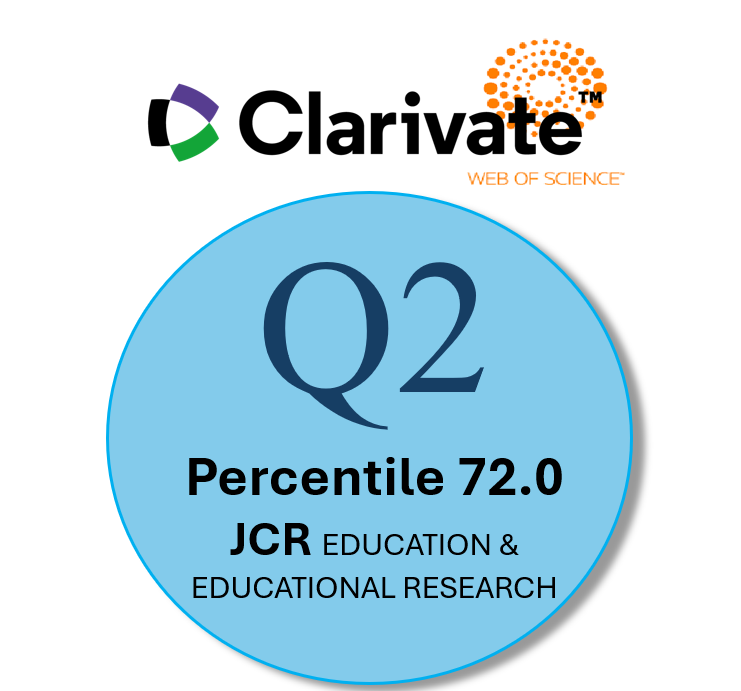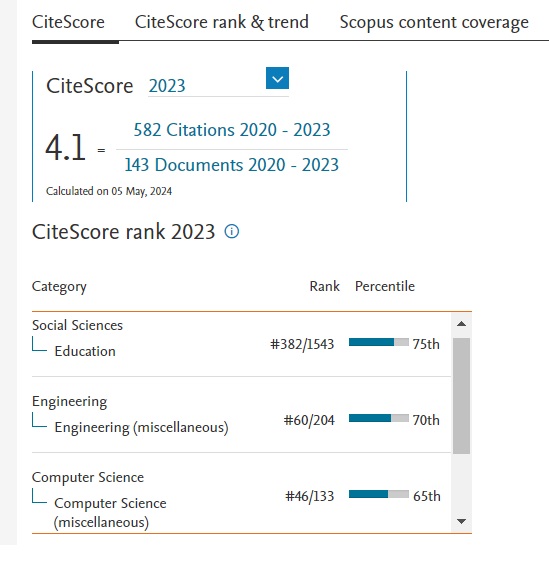Metaverso en Educación: una revisión sistemática
Agencias de apoyo
- Project OTRI-University of Granada with financing code number 4995
Resumen
Abordar las nuevas necesidades y requerimientos educativos sigue siendo un desafío. Debido a la pandemia de COVID-19 y los avances tecnológicos, los entornos de aprendizaje se están transformando. El metaverso es una extensión virtual 3D realista del mundo físico generada por computadora, ya que sumerge a los usuarios, les permite interactuar con otros y con objetos digitales, y elimina las limitaciones de distancia y diferencias de tiempo. Se caracteriza por la inmersividad, la interactividad y la personificación. Está ganando terreno el uso del metaverso en los procesos educativos y formativos para crear nuevos entornos de aprendizaje que permitan a los aprendices desenvolverse en una realidad paralela, segura y personalizada. El objetivo de este estudio es analizar la investigación existente sobre el metaverso en el ámbito educativo. Por lo tanto, se ha llevado a cabo una revisión sistemática de la literatura utilizando las bases de datos Web of Science (WoS) y Scopus. Para proporcionar resultados más completos y constructivos, no se establecieron restricciones de año, nivel educativo o materias. Como el metaverso es un tema nuevo y teniendo en cuenta los criterios de inclusión y exclusión, se han analizado un total de 17 artículos. Según los hallazgos, el metaverso tiene el potencial de enriquecer y transformar la educación y conducir a mejores resultados de aprendizaje y una mayor participación y motivación de los estudiantes. A pesar de este hecho, el uso del metaverso en educación es todavía preliminar, por lo que se deben realizar más investigaciones y experimentos en todos los niveles educativos y poblaciones para evaluar su impacto y mejorar su efectividad. Finalmente, se evidenció la necesidad de diseñar instrumentos válidos para evaluar las experiencias educativas generadas dentro del metaverso.
Descargas
-
Resumen8031
-
PDF 5118
Citas
Abbate, S., Centobelli, P., Cerchione, R., Oropallo, E., & Riccio, E. (2022, April). A first bibliometric literature review on Metaverse. In 2022 IEEE Technology and Engineering Management Conference (pp. 254-260). IEEE. https://doi.org/10.1109/TEMSCONEUROPE54743.2022.9802015
Aksnes, D.W., & Sivertsen, G. (2019). A criteria-based assessment of the coverage of Scopus and Web of Science. Journal of Data and Information Science, 4(1), 1-21. https://doi.org/10.2478/jdis-2019-0001
Anastasiadis, T., Lampropoulos, G., & Siakas, K. (2018). Digital game-based learning and serious games in education. International Journal of Advances in Scientific Research and Engineering, 4(12), 139–144. https://doi.org/10.31695/IJASRE.2018.33016
Barab, S., & Dede, C. (2007). Games and immersive participatory simulations for science education: An emerging type of curricula. Journal of Science Education and Technology, 16(1), 1–3. https://doi.org/10.1007/s10956-007-9043-9
Baynat, M. M. E., & López, S. M. (2020). La machinima entrevista de trabajo/entretien d’embauche: Une ressource numérique pour l’apprentissage de la langue française en contexte universitaire. Synergies Europe, 15, 163–179.
Billingsley, G., Smith, S., Smith, S., & Meritt, J. (2019). A systematic literature review of using immersive virtual reality technology in teacher education. Journal of Interactive Learning Research, 30(1), 65–90.
Calongne, C., Sheehy, P., & Stricker, A. (2013). Gemeinschaft identity in a gesellschaft metaverse. In The immersive internet (pp. 180–191). Palgrave Macmillan UK. https://doi.org/10.1057/9781137283023_16
Castronova, E. (2001). Virtual worlds: A first-hand account of market and society on the cyberian frontier. SSRN Electronic Journal. https://doi.org/10.2139/ssrn.294828
Chen, D., & Zhang, R. (2022). Exploring Research Trends of Emerging Technologies in Health Metaverse: A Bibliometric Analysis. Social Science Research Network, 5, 1-32. https://dx.doi.org/10.2139/ssrn.3998068
Choi, H., & Kim, S. (2017). A content service deployment plan for metaverse museum exhibitionscentering on the combination of beacons and HMDs. International Journal of Information Management, 37(1), 1519–1527. https://doi.org/10.1016/j.ijinfomgt.2016.04.017
Collins, C. (2008). Looking to the future: Higher education in the metaverse. Educause Review, 43(5), 51–63.
Colomo-Magaña, E., Cívico-Ariza, A., Ruiz-Palmero, J., & Sánchez-Rivas, E. (2021). Problematic use of ICTS in trainee teachers during COVID-19: A sex-based analysis. Contemporary Educational Technology, 13(4). https://doi.org/10.30935/cedtech/10988
Daniel, S.J. (2020). Education and the COVID-19 pandemic. Prospects, 49, 91-96. https://doi.org/10.1007/s11125-020-09464-3
Dillenbourg, P., Schneider, D., Synteta, P., & others. (2002). Virtual learning environments. Proceedings of the 3rd Hellenic Conference Information & Communication Technologies in Education, 3–18.
Dı́az, J. E. M., Saldaña, C., & Avila, C. (2020). Virtual world as a resource for hybrid education. International Journal of Emerging Technologies in Learning (iJET), 15(15), 94–109. https://doi.org/10.3991/ijet.v15i15.13025
Falchuk, B., Loeb, S., & Neff, R. (2018). The social metaverse: Battle for privacy. IEEE Technology and Society Magazine, 37(2), 52–61. https://doi.org/10.1109/mts.2018.2826060
Hew, K. F., Lan, M., Tang, Y., Jia, C., & Lo, C. K. (2019). Where is the “theory” within the field of educational technology research?. British Journal of Educational Technology, 50(3), 956-971. https://doi.org/10.1111/bjet.12770
Hughes, J., Thomas, R., & Scharber, C. (2006). Assessing technology integration: The RAT–replacement, amplification, and transformation-framework. Society for Information Technology & Teacher Education International Conference, 1616–1620.
Jackman, J. A., Gentile, D. A., Cho, N. J., & Park, Y. (2021). Addressing the digital skills gap for future education. Nature Human Behaviour, 5(5), 542-545. https://doi.org/10.1038/s41562-021-01074-z
Januszewski, A., & Molenda, M. (2013). Educational technology: A definition with commentary. Routledge.
Lampropoulos, G., Barkoukis, V., Burden, K., & Anastasiadis, T. (2021). 360-degree video in education: An overview and a comparative social media data analysis of the last decade. Smart Learning Environments, 8(1). https://doi.org/10.1186/s40561-021-00165-8
Lampropoulos, G., Keramopoulos, E., Diamantaras, K., & Evangelidis, G. (2022). Augmented reality and gamification in education: A systematic literature review of research, applications, and empirical studies. Applied Sciences, 12(13), 6809. https://doi.org/10.3390/app12136809
Lee, J. Y. (2021). A study on metaverse hype for sustainable growth. International journal of advanced smart convergence, 10(3), 72-80. https://doi.org/10.7236/IJASC.2021.10.3.72
Lemos, A. (2007). Ciberespaço e tecnologias móveis: Processos de territorialização e desterritorialização na cibercultura. Imagem, Visibilidade e Cultura Midiática. Livro Da XV COMPÓS. Porto Alegre: Sulina, 277–293.
López-Belmonte, J., Moreno-Guerrero, A.-J., López-Núñez, J.-A., & Pozo-Sánchez, S. (2021). Scientific production of flipped learning and flipped classroom in Web of Science. Texto Livre: Linguagem E Tecnologia, 14(1), 1-26. https://doi.org/10.35699/1983-3652.2021.26266
López-Belmonte, J., Pozo-Sánchez, S., Lampropoulos, G., & Moreno-Guerrero, A.J. (2022). Design and validation of a questionnaire for the evaluation of educational experiences in the metaverse in Spanish students (METAEDU). Heliyon, 8(11), 1-13. https://doi.org/10.1016/j.heliyon.2022.e11364
Márquez, I. (2010). La simulación como aprendizaje: Educación y mundos virtuales. Documento Presentado En El II Congreso Internacional de Comunicación, 3, 1–11.
Moreno-Guerrero, A., Soler-Costa, R., Marín-Marín, J., & López-Belmonte, J. (2021). Flipped learning and good teaching practices in secondary education. Comunicar, 29(68), 107-117. https://doi.org/10.3916/C68-2021-09
Mystakidis, S., Christopoulos, A. & Pellas, N. (2022). A systematic mapping review of augmented reality applications to support STEM learning in higher education. Education and Information Technologies, 27, 1883–1927. https://doi.org/10.1007/s10639-021-10682-1
Narin, N. G. (2021). A content analysis of the metaverse articles. Journal of Metaverse, 1(1), 17-24. https://dergipark.org.tr/en/pub/jmv/issue/67581/1051382
Nurhidayah, N. N., Halim, N., & Basri, M. (2020). Analyzing student’s learning outcome using systemic approach. Asian EFL Journal Research Articles, 27(4), 230–247.
Page, M. J., McKenzie, J. E., Bossuyt, P. M., Boutron, I., Hoffmann, T. C., Mulrow, C. D., ... & Moher, D. (2021). The PRISMA 2020 statement: an updated guideline for reporting systematic reviews. BMJ, 372(71), 1-9. https://doi.org/10.1136/bmj.n71
Pan, Z., Cheok, A. D., Yang, H., Zhu, J., & Shi, J. (2006). Virtual reality and mixed reality for virtual learning environments. Computers & Graphics, 30(1), 20–28. https://doi.org/10.1016/j.cag.2005.10.004
Park, S. M., & Kim, Y. G. (2022). A Metaverse: Taxonomy, components, applications, and open challenges. IEEE Access, 10, 4209-4251. https://doi.org/10.1109/ACCESS.2021.3140175
Park, S., Min, K., & Kim, S. (2021). Differences in learning motivation among bartle’s player types and measures for the delivery of sustainable gameful experiences. Sustainability, 13(16), 9121. https://doi.org/10.3390/su13169121
Pozo-Sánchez, S., López-Belmonte, J., Fuentes-Cabrera, A., & López-Núñez, J. A. (2021). Aplicación trietápica del flipped learning en el área de las ciencias. Campus Virtuales, 10(1), 35-47.
Ratten, V., & Jones, P. (2021). Covid-19 and entrepreneurship education: Implications for advancing research and practice. The International Journal of Management Education, 19(1), 1-10. https://doi.org/10.1016/j.ijme.2020.100432
Reisoğlu, I., Topu, B., Yılmaz, R., Yılmaz, T. K., & Göktaş, Y. (2017). 3D virtual learning environments in education: A meta-review. Asia Pacific Education Review, 18(1), 81–100.
Reyes, C. E. G. (2020). Percepción de estudiantes de bachillerato sobre el uso de metaverse en experiencias de aprendizaje de realidad aumentada en matemáticas. Pixel-Bit, Revista de Medios y Educación, 58, 143–159. https://doi.org/10.12795/pixelbit.74367
Rodríguez-García, A.-M., Moreno-Guerrero, A.-J., & López-Belmonte, J. (2020). Nomophobia: An Individual’s Growing Fear of Being without a Smartphone—A Systematic Literature Review. International Journal of Environmental Research and Public Health, 17(2), 1-19. https://doi.org/10.3390/ijerph17020580
Rospigliosi, P. A. (2022). Metaverse or Simulacra? Roblox, Minecraft, Meta and the turn to virtual reality for education, socialisation and work. Interactive Learning Environments, 30(1), 1-3. https://doi.org/10.1080/10494820.2022.2022899
Schaf, F. M., Paladini, S., & Pereira, C. E. (2012, April). 3D AutoSysLab prototype. Proceedings of the 2012 IEEE Global Engineering Education Conference (EDUCON). https://doi.org/10.1109/educon.2012.6201192
Schneider, S. L., & Council, M. L. (2021). Distance learning in the era of COVID-19. Archives of dermatological research, 313(5), 389-390. https://doi.org/10.1007/s00403-020-02088-9
Smart, J., Cascio, J., Paffendorf, J., & others. (2007). Metaverse roadmap: Pathways to the 3D web. Metaverse: A Cross-Industry Public Foresight Project.
Soler-Costa, R., Lafarga-Ostáriz, P., Mauri-Medrano, M., & Moreno-Guerrero, A.-J. (2021). Netiquette: Ethic, Education, and Behavior on Internet—A Systematic Literature Review. International Journal of Environmental Research and Public Health, 18(3), 1-15. https://doi.org/10.3390/ijerph18031212
Sparkes, M. (2021). What is a metaverse. New Scientist, 251(3348), 1-18. https://doi.org/10.1016/S0262-4079(21)01450-0
Stephenson, N. (1992). Snow crash: A novel. Bantam Books.
Tarouco, L., Gorziza, B., Correa, Y., Amaral, E. M. H., & Muller, T. (2013, March). Virtual laboratory for teaching calculus: An immersive experience. 2013 IEEE Global Engineering Education Conference (EDUCON). https://doi.org/10.1109/educon.2013.6530195
Tas, N., & Bolat, Y. İ. (2022). Bibliometric Mapping of Metaverse in Education. International Journal of Technology in Education, 5(3), 440-458. https://doi.org/10.46328/ijte.323
Tlili, A., Huang, R., Shehata, B., Liu, D., Zhao, J., Metwally, A. H. S., ... & Burgos, D. (2022). Is Metaverse in education a blessing or a curse: a combined content and bibliometric analysis. Smart Learning Environments, 9(1), 1-31. https://doi.org/10.1186/s40561-022-00205-x
Vaca Barahona, B., Cela Ranilla, J., & Gallardo Echenique, E. E. (2016). The communication in simulated learning environments.
Zawacki-Richter, O., & Latchem, C. (2018). Exploring four decades of research in computers & education. Computers & Education, 122, 136–152. https://doi.org/10.1016/j.compedu.2018.04.001
Zeidler, D. L., Sadler, T. D., Simmons, M. L., & Howes, E. V. (2005). Beyond STS: A research-based framework for socioscientific issues education. Science Education, 89(3), 357–377. https://doi.org/10.1002/sce.20048
Zhao, Y., Pino, A. M., & Sánchez, M. C. (2021). Digital competence in higher education research: A systematic literature review. Computers & Education, 168, 104212. https://doi.org/10.1016/j.compedu.2021.104212
Derechos de autor 2023 Revista de Educación a Distancia (RED)

Esta obra está bajo una licencia internacional Creative Commons Atribución-NoComercial 4.0.
Las obras que se publican en esta revista están sujetas a los siguientes términos:
1. El Servicio de Publicaciones de la Universidad de Murcia (la editorial) conserva los derechos patrimoniales (copyright) de las obras publicadas, y favorece y permite la reutilización de las mismas bajo la licencia de uso indicada en el punto 2.
2. Las obras se publican en la edición electrónica de la revista bajo una licencia Creative Commons Reconocimiento-NoComercial-SinObraDerivada 3.0 España (texto legal). Se pueden copiar, usar, difundir, transmitir y exponer públicamente, siempre que: i) se cite la autoría y la fuente original de su publicación (revista, editorial y URL de la obra); ii) no se usen para fines comerciales; iii) se mencione la existencia y especificaciones de esta licencia de uso.
3. Condiciones de auto-archivo. Se permite y se anima a los autores a difundir electrónicamente las versiones pre-print (versión antes de ser evaluada) y/o post-print (versión evaluada y aceptada para su publicación) de sus obras antes de su publicación, ya que favorece su circulación y difusión más temprana y con ello un posible aumento en su citación y alcance entre la comunidad académica. Color RoMEO: verde.














